Safe Handling Of Pool Chemicals
Maintaining a sparkling, inviting pool is the hallmark of a dedicated pool owner. However, the arsenal of pool chemicals needed to achieve this can be just as potentially harmful if not properly handled. The objective of pool chemical usage is not just water sanitation and balancing; it’s also to ensure that your pool is a safe haven for relaxation and fun. Unintended accidents like chemical burns, respiratory issues, and contamination of water bodies can stem from improper handling. This comprehensive guide is designed to equip pool owners with the knowledge and practices for safe and responsible use of pool chemicals, safeguarding not only your health but also the environment.
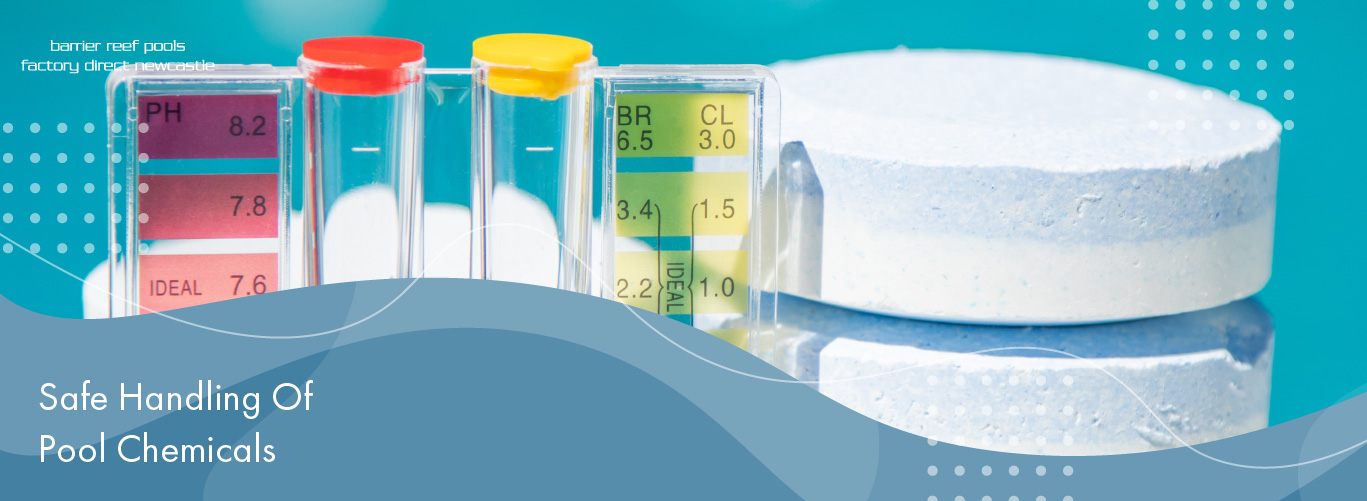
Importance of Correct Handling
Creating a safe environment around your pool isn’t just about physical barriers and lifeguards; it involves every aspect of the pool, including the chemicals used to maintain it. The improper handling of pool chemicals can lead to severe health hazards, especially for those not familiar with the substances. The risks can range from skin irritations and eye damage to respiratory issues and even long-term ailments.
Beyond personal health, mishandling pool chemicals can have detrimental effects on the environment. Spillage during transport or disposal, often lead to contamination of local water supplies, causing harm to aquatic life. Awareness and adherence to meticulous handling protocols are essential for a safer, cleaner pool and planet.
Understanding Pool Chemicals
Before even opening a container, it’s crucial to recognise what you’re dealing with. Chlorine, pH adjusters, algaecides, and stabilisers are common chemicals in a pool owner’s repertoire. Each has a specific purpose and means of application. Chlorine is used to destroy pathogens in the water, while pH adjusters ensure the water’s acidity or alkalinity remains within safe limits. Algaecides prevent and eradicate algae growth, and stabilisers maintain the effectiveness of chlorine.
Each of these chemicals reacts differently in varied water conditions. pH adjusters, for instance, can be highly reactive when the water’s pH level is far from the ideal range of 7.4 to 7.6, which affects their dilution rates and effectiveness. It’s important to follow the manufacturer’s guidelines precisely to avoid adverse effects on your pool or health.
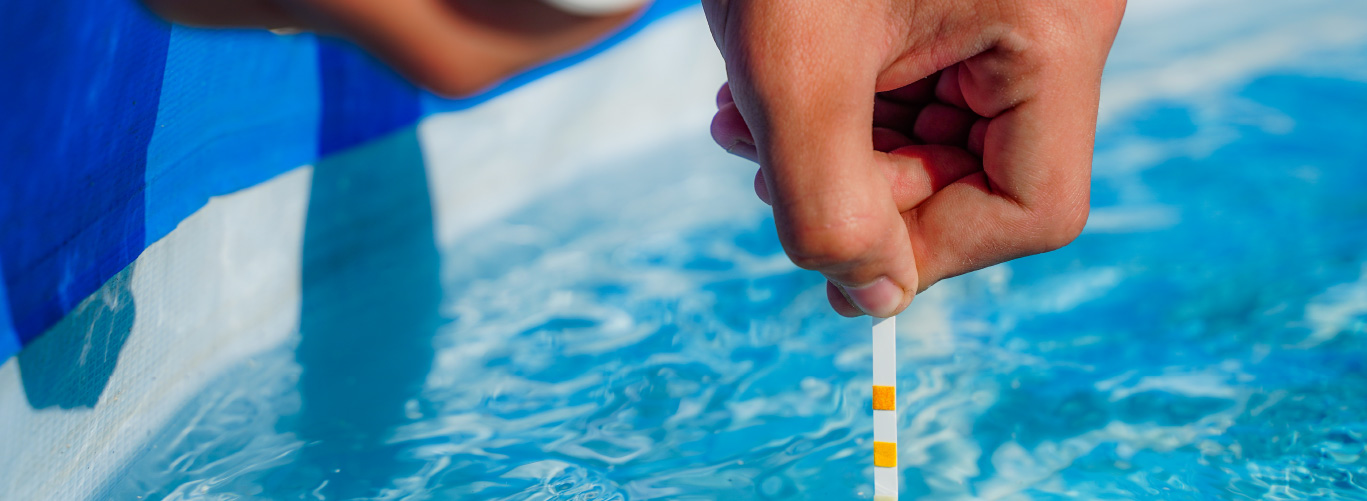
Safe Storage Practices
Proper storage is the first line of defence against accidental chemical hazards. Storing chemicals in a dry, well-ventilated area away from direct sunlight and with stable temperatures prevents them from breaking down or reacting prematurely. Storing acids and chlorine separately, as well as keeping all chemicals off the ground, reduces the risk of mixing due to leaks or spills. Always keep chemicals in their original, labelled containers to ensure you know exactly what you’re reaching for.
Proper Handling and Mixing
Handling pool chemicals safely involves more than just remembering to wear gloves. When diluting and mixing chemicals, it’s important to add chemicals to water, not water to chemicals. This simple “A-to-W” rule minimises the chance of splashes, which can react with air to create fumes or come into contact with your skin. Understand the required concentration for each chemical and never overuse. Overuse can lead to an imbalance in the water chemistry, while underuse can render the chemicals ineffective, increasing the risk of water-borne illnesses and the development of resistant microorganisms.
Personal Protection Equipment (PPE)
The essential PPE for pool chemical handling includes safety goggles, rubber gloves, and an apron or overalls, at the very least. These protective items form a barrier between you and the chemicals, preventing direct contact with your skin and eyes. Although it might feel like an inconvenience, using PPE is a non-negotiable step towards your safety, and it’s a valuable practice to maintain not only for yourself but for anyone else handling pool chemicals.
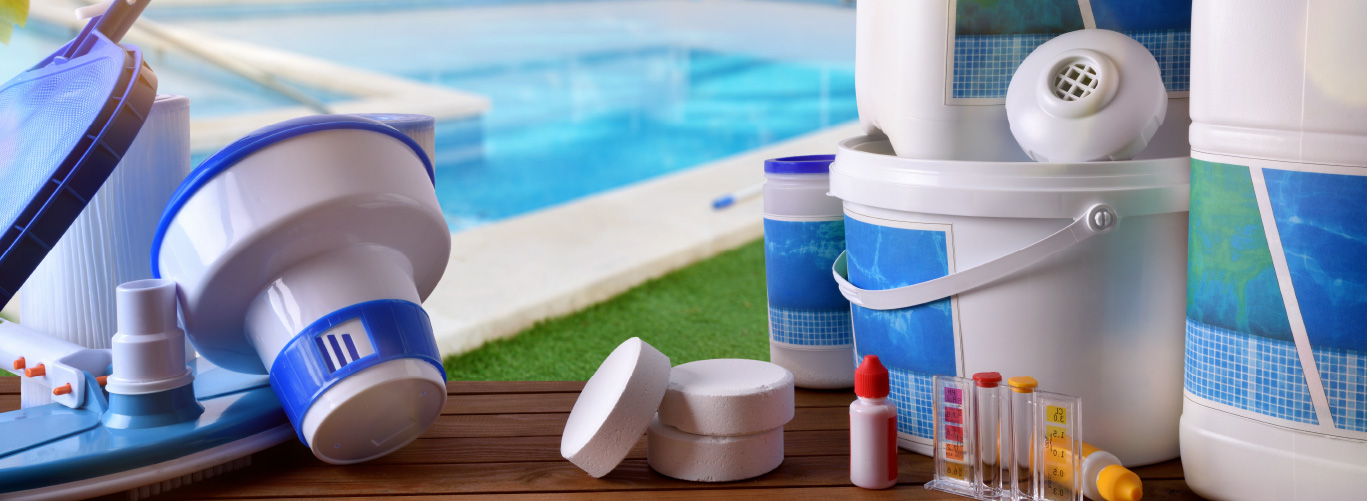
Responding to Pool Chemical Accidents
In the event of a chemical spill or exposure, quick and correct action is key. Remove any contaminated clothing and immediate rinse the affected area with water for at least 15 minutes, making sure to move away from the site of exposure, if safe to do so. Contact your local poison control centre, and follow their instructions. Furthermore, keeping a fully stocked first-aid kit near your pool area, including items for chemical exposure, ensures you can respond effectively to any emergencies.
Understanding stated precautions and being ready to act are crucial elements in minimising the impact of an accident. The goal is to always be prepared and equipped to handle any potential hazards before they escalate.
Environmental Considerations
Responsible pool ownership goes well beyond just the immediate area around the pool. It encompasses a commitment to environmental stewardship, ensuring that the chemicals used in pool maintenance don’t negatively impact the surrounding ecosystem. It’s crucial to understand that chemicals should never be disposed of down household drains or thrown away in the regular trash. These substances can cause significant harm to local waterways and wildlife if not handled properly.
To mitigate such risks, it’s advised to recycle containers that are empty but once held pool chemicals, showcasing a commitment to sustainability. Moreover, when it comes time to dispose of these empty chemical vessels, doing so correctly and responsibly is paramount. This often involves seeking out local hazardous waste collection services, which offer proper disposal methods specifically designed to protect our planet. Utilising these services ensures that harmful chemicals are neutralised and disposed of in a way that prevents environmental contamination, thereby contributing to the overall health and safety of our communities and the natural world.
Conclusion
Safe handling of pool chemicals is a critical component of pool ownership. It’s not only about keeping the water clean but also managing the products that help you achieve that cleanliness. By following the guidelines provided by manufacturers, understanding the nature of the chemicals you use, staying well-equipped with the right protective gear, and being prepared for accidents and environmental considerations, you can minimise the risks associated with pool chemical usage. This awareness is not just preventative; it’s empowering. You have the power to maintain your pool in a way that protects your home, your health, and your environment. Remember that when it comes to pool chemicals, safety should always be in season.
Safe Handling Of Pool Chemicals
Maintaining a sparkling, inviting pool is the hallmark of a dedicated pool owner. However, the arsenal of pool chemicals needed to achieve this can be just as potentially harmful if not properly handled. The objective of pool chemical usage is not just water sanitation and balancing; it’s also to ensure that your pool is a safe haven for relaxation and fun. Unintended accidents like chemical burns, respiratory issues, and contamination of water bodies can stem from improper handling. This comprehensive guide is designed to equip pool owners with the knowledge and practices for safe and responsible use of pool chemicals, safeguarding not only your health but also the environment.
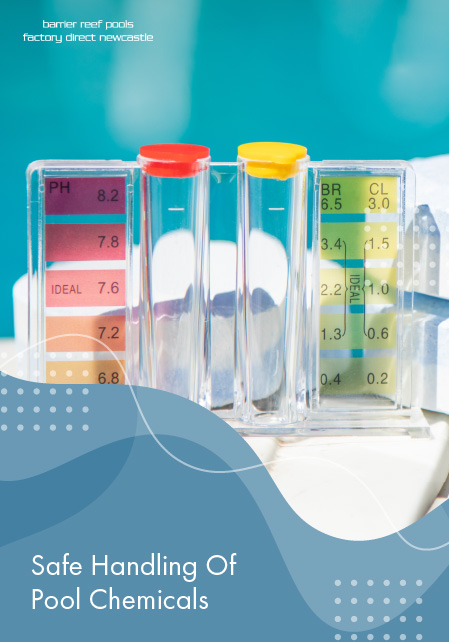
Importance of Correct Handling
Creating a safe environment around your pool isn’t just about physical barriers and lifeguards; it involves every aspect of the pool, including the chemicals used to maintain it. The improper handling of pool chemicals can lead to severe health hazards, especially for those not familiar with the substances. The risks can range from skin irritations and eye damage to respiratory issues and even long-term ailments.
Beyond personal health, mishandling pool chemicals can have detrimental effects on the environment. Spillage during transport or disposal, often lead to contamination of local water supplies, causing harm to aquatic life. Awareness and adherence to meticulous handling protocols are essential for a safer, cleaner pool and planet.
Understanding Pool Chemicals
Before even opening a container, it’s crucial to recognise what you’re dealing with. Chlorine, pH adjusters, algaecides, and stabilisers are common chemicals in a pool owner’s repertoire. Each has a specific purpose and means of application. Chlorine is used to destroy pathogens in the water, while pH adjusters ensure the water’s acidity or alkalinity remains within safe limits. Algaecides prevent and eradicate algae growth, and stabilisers maintain the effectiveness of chlorine.
Each of these chemicals reacts differently in varied water conditions. pH adjusters, for instance, can be highly reactive when the water’s pH level is far from the ideal range of 7.4 to 7.6, which affects their dilution rates and effectiveness. It’s important to follow the manufacturer’s guidelines precisely to avoid adverse effects on your pool or health.
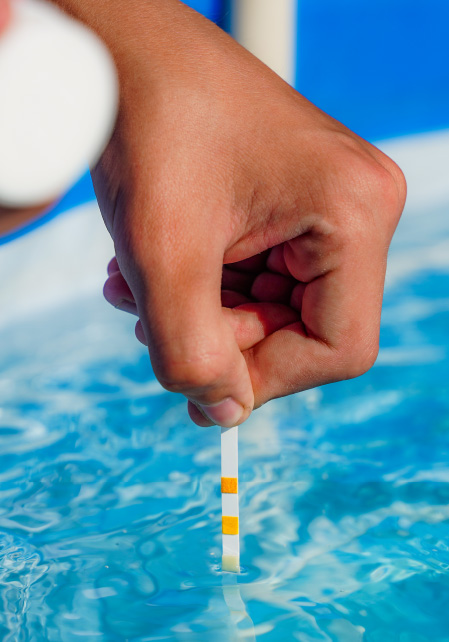
Safe Storage Practices
Proper storage is the first line of defence against accidental chemical hazards. Storing chemicals in a dry, well-ventilated area away from direct sunlight and with stable temperatures prevents them from breaking down or reacting prematurely. Storing acids and chlorine separately, as well as keeping all chemicals off the ground, reduces the risk of mixing due to leaks or spills. Always keep chemicals in their original, labelled containers to ensure you know exactly what you’re reaching for.
Proper Handling and Mixing
Handling pool chemicals safely involves more than just remembering to wear gloves. When diluting and mixing chemicals, it’s important to add chemicals to water, not water to chemicals. This simple “A-to-W” rule minimises the chance of splashes, which can react with air to create fumes or come into contact with your skin. Understand the required concentration for each chemical and never overuse. Overuse can lead to an imbalance in the water chemistry, while underuse can render the chemicals ineffective, increasing the risk of water-borne illnesses and the development of resistant microorganisms.
Personal Protection Equipment (PPE)
The essential PPE for pool chemical handling includes safety goggles, rubber gloves, and an apron or overalls, at the very least. These protective items form a barrier between you and the chemicals, preventing direct contact with your skin and eyes. Although it might feel like an inconvenience, using PPE is a non-negotiable step towards your safety, and it’s a valuable practice to maintain not only for yourself but for anyone else handling pool chemicals.
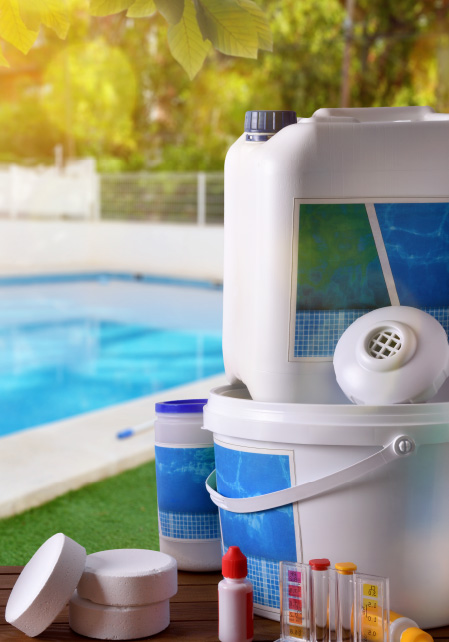
Responding to Pool Chemical Accidents
In the event of a chemical spill or exposure, quick and correct action is key. Remove any contaminated clothing and immediate rinse the affected area with water for at least 15 minutes, making sure to move away from the site of exposure, if safe to do so. Contact your local poison control centre, and follow their instructions. Furthermore, keeping a fully stocked first-aid kit near your pool area, including items for chemical exposure, ensures you can respond effectively to any emergencies.
Understanding stated precautions and being ready to act are crucial elements in minimising the impact of an accident. The goal is to always be prepared and equipped to handle any potential hazards before they escalate.
Environmental Considerations
Responsible pool ownership goes well beyond just the immediate area around the pool. It encompasses a commitment to environmental stewardship, ensuring that the chemicals used in pool maintenance don’t negatively impact the surrounding ecosystem. It’s crucial to understand that chemicals should never be disposed of down household drains or thrown away in the regular trash. These substances can cause significant harm to local waterways and wildlife if not handled properly.
To mitigate such risks, it’s advised to recycle containers that are empty but once held pool chemicals, showcasing a commitment to sustainability. Moreover, when it comes time to dispose of these empty chemical vessels, doing so correctly and responsibly is paramount. This often involves seeking out local hazardous waste collection services, which offer proper disposal methods specifically designed to protect our planet. Utilising these services ensures that harmful chemicals are neutralised and disposed of in a way that prevents environmental contamination, thereby contributing to the overall health and safety of our communities and the natural world.
Conclusion
Safe handling of pool chemicals is a critical component of pool ownership. It’s not only about keeping the water clean but also managing the products that help you achieve that cleanliness. By following the guidelines provided by manufacturers, understanding the nature of the chemicals you use, staying well-equipped with the right protective gear, and being prepared for accidents and environmental considerations, you can minimise the risks associated with pool chemical usage. This awareness is not just preventative; it’s empowering. You have the power to maintain your pool in a way that protects your home, your health, and your environment. Remember that when it comes to pool chemicals, safety should always be in season.



